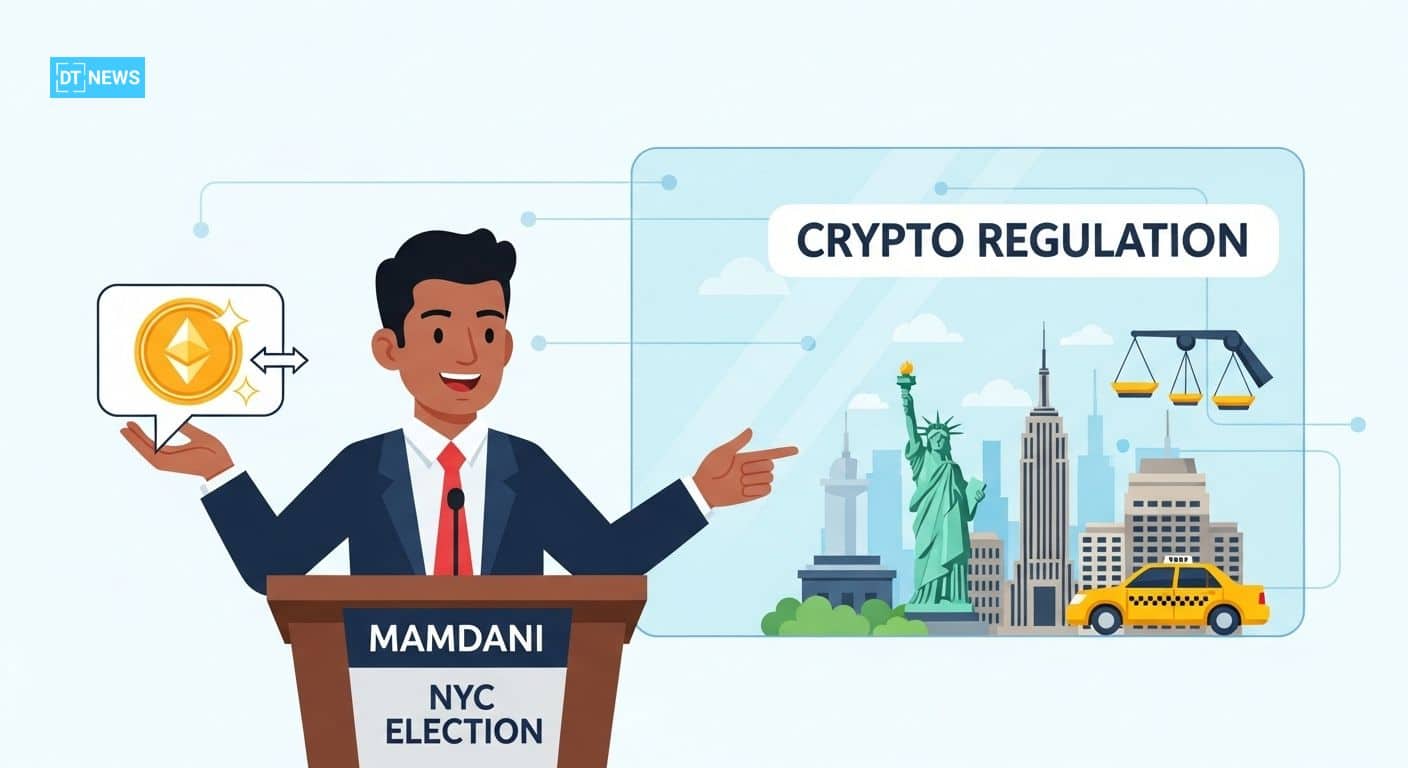This article was first published on Deythere.
The election of Zohran Mamdani as mayor of New York City has elicited diverse reactions from the crypto industry. While the sector watched closely during the campaign, Mamdani’s crypto stance remains largely untested.
With the mayor-elect expected to take office on January 1, 2026, the world of crypto regulation in NYC is waiting to see how his administration will shape licensing, taxation and enforcement.
The question remains: Is this the beginning of a breakout era for blockchain in the city or the start of tighter regulation?
The Upset and the Crypto Industry’s Attention
Zohran Mamdani won on November 4, 2025; defeating former governor Andrew Cuomo and Republican Curtis Sliwa. The crypto sector was paying attention because of New York’s importance in digital-asset regulation.
The crypto industry reportedly backed the Cuomo campaign via Innovate NY PAC, fearing Mamdani’s left-leaning platform would shift the regulatory balance.
Mamdani didn’t make many crypto-specific comments during the campaign but his support for strong investor protection after crypto failures aligned him with regulatory caution.
In 2023, he reportedly supported New York Attorney General Letitia James’s bill to “end the fraud and dysfunction” in crypto.
Industry Reaction
The industry response to Zohran Mamdani election win shows the tension between hope and fear around crypto regulation in New York. On one hand, big industry figures like Tyler Winklevoss were alarmed, saying Mamdani’s win would be a blow to crypto-friendly policy.
Winklevoss said the result was driven by “spoiled, educated university students” disconnected from finance.
Hedge fund billionaire Bill Ackman had reportedly donated $1 million to Defend NYC and $250,000 to Fix the City; two political action committees opposing Mamdani. The candidate fired back, saying:
“He’s spending more money against me than I would even tax him.”
After the unexpected Zohran Mamdani election victory Tuesday night, Ackman struck a more conciliatory tone, posting:
“Now you have a big responsibility. If I can help NYC, just let me know what I can do.”
On the other hand; others in the crypto/Web3 ecosystem saw his win as aligned with blockchain’s decentralized ethos.
As media-founder Zack Guzmán said,
“Everybody was kind of caught in the old way of doing things… that’s kind of what crypto represented too: this alternative outside the finance system.”
The tension borders around this: will the city roll back restrictions and support the industry, or emphasize consumer-protection, taxation, and stricter oversight, and how local business models adapt?
Crypto Regulation in NYC
Given Mamdani’s campaign on taxing the top 1% and supporting affordability initiatives, the crypto community expects potential changes in local tax incentives or business-friendly zones.
Bloomberg’s report noted that Wall Street’s support for other candidates revealed corporate unease about a Mamdani mayorship.
While New York State’s BitLicense regime dominates crypto firm licensing, the city could streamline permitting, business-registration or local innovation zones to attract blockchain startups; or conversely, raise local compliance burdens as part of his progressive agenda.
Mamdani’s public record shows strong support for investor protection in crypto. His statement that “when crypto companies collapse, it isn’t the rich who suffer, it’s small investors who disproportionately come from low-income and communities of color,” suggests the city may prioritize oversight rather than expansion.
Conclusion
With Mamdani taking office in January 2026, crypto regulation in NYC, observers are on the lookout for the mayor’s appointments and nominations related to economic development and tech clusters. If pro-blockchain voices get seats, an industry-friendly stance may increase.
Any local tax or incentive packages proposed by the mayor’s office or city council for tech/crypto firms will show how welcoming the city is.
With his track record on consumer protection and progressive policy; the crypto industry will be watching to see if New York will be more supportive or more regulated.
Glossary
BitLicense: a regulatory framework that governs virtual-currency businesses operating in NYC, including licensing, compliance, and consumer protection.
Consumer protection (crypto): laws and regulations to protect retail investors from fraud, mis-selling, and unfair practices in the digital-asset space.
Municipal tax incentive: local government policies that reduce or waive taxes or fees for businesses operating in a specific area or sector to encourage investment and growth.
Investor protection (crypto): regulatory measures; disclosure requirements, auditing and risk warnings; designed to protect smaller investors from systemic failures or market manipulation in crypto markets.
Frequently Asked Questions About Zohran Mamdani Election Win
Does the mayor of New York City regulate crypto firms?
No. Most regulation of digital-asset firms in New York is at the state level (BitLicense) or federal level. The mayor controls local tax policy, permitting, business incentives and city-level economic development programs.
Will Mamdani’s administration be pro-crypto?
While his campaign was about affordability, tax increases on the wealthy and investor protection in crypto, he didn’t make big pro-crypto promises. Industry is watching to see how the city balances innovation with oversight.
Can the mayor pass crypto-specific legislation at the city level?
Big regulatory changes (e.g. securities law, national licensing) are beyond city jurisdiction. City-level legislation would be on local taxation, business licensing, zoning or fees for crypto firms.
What are the risks for the crypto industry in New York under this new administration?
Risks include local business tax increases, more local oversight or consumer protection enforcement, and broader alignment of crypto policy with social equity and public interest rather than just innovation-driven growth.


















































































































